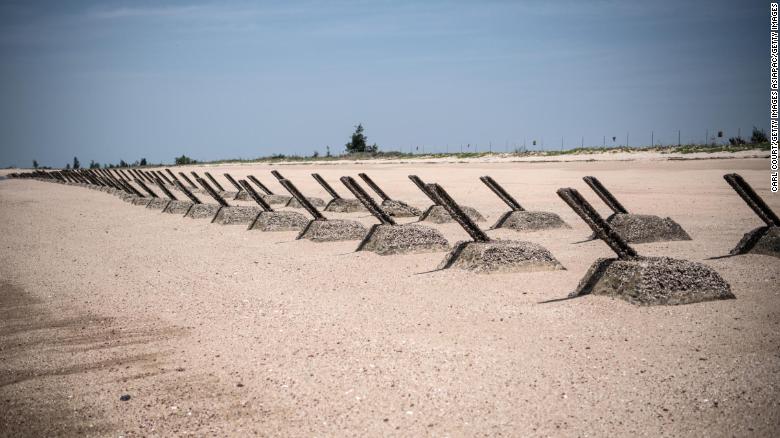Ben Westcott and Nectar Gan

Hong Kong (CNN)Among the recriminations and accusations, there was one point of consensus when American and Chinese diplomats met in the coastal city of Tianjin earlier this week: no one wants to see the world's most important relationship deteriorate into armed conflict.
But there was little consensus on a concrete way to avoid that catastrophe. And that has experts worried.
Washington and Beijing have been trapped in a spiral of anger and suspicion for several years, but the situation has deteriorated rapidly since the beginning of the Covid-19 pandemic, amid finger-pointing over the origins of the virus.
Meetings between the two sides are few and far between — and when they occur, such as in Alaska in March, they are bitter and confrontational. The US is without an ambassador in Beijing. There have been no moves to reopen the recently shuttered United States consulate in Chengdu or the Chinese consulate in Houston. And the appointment of a new Chinese ambassador to Washington, while a positive step, is unlikely to deescalate tensions in the short term.
There's certainly no small amount of antagonism between the two sides at present. Experts point to rising brinksmanship over Taiwan and the expanding standoff in the South China Sea as possible military flashpoints with unpredictable consequences for both sides.
Speaking in Tianjin, both sides said despite the current state of relations, they wanted to avoid direct confrontation. US Deputy Secretary of State Wendy Sherman underscored that while Washington welcomed "stiff competition," it did not seek conflict with Beijing. Meanwhile, China's Foreign Minister Xie Feng told Sherman the Chinese people "cherish peace."
Yet Willy Lam, an adjunct professor at the Chinese University of Hong Kong, said neither side had actually put anything in place to stop conflict from happening. No further talks are planned publicly, and expectations of a possible meeting between US President Joe Biden and Chinese leader Xi Jinping at the G20 in October weren't raised.
"So there is room for further deterioration but there are no signs of possible improvement, even in areas where they have common interests," said Lam.
At a speech in Singapore on Tuesday night, US Secretary of Defense Lloyd Austin said while the US didn't want conflict with China, Beijing was showing an "unwillingness to resolve disputes peacefully and respect the rule of law" in the South China Sea, the Taiwan Strait and in the western region of Xinjiang.
At the same time, the United Kingdom — a close US ally — has sent a carrier group to the South China Sea, including the Queen Elizabeth aircraft carrier, and announced it would permanently deploy two warships to Asian waters.
Experts said the growing militarization of both the South China Sea and air and sea around Taiwan puts the US and China, as well as their allied nations, at risk of an accidental collision in a contested area or exchange of gunfire that spirals out of control.
Both sides have been able to cool tensions in the past, such as in 2001 when a US Navy surveillance plane collided with a Chinese fighter jet, leading to a tense 11-day standoff over the surviving American pilot. Eventually he was released and tensions cooled — but Orville Schell, director of the Asia Society's Center on US China Relations, said both sides might not be as keen to negotiate this time.
"They're headed towards a train wreck here," he said. In particular, Schell described the Taiwan Strait as the "Chernobyl" of international relations, with the repeated military drills and flyovers by Chinese aircraft a disaster waiting to happen.
"This is where the globe is most stressed, China and the US and Taiwan are right there at the epicenter," he said.
Both the US and China have offered potential ways forward to avoid any further deterioration. Before Sherman went to Tianjin, US officials said they wanted to emphasize the need for "guard rails" in the US-China relationship. Washington has mooted the idea of creating an emergency hotline between Washington and Beijing, similar to the "red phone" between the US and the Soviet Union during the Cold War intended to allow for direct communication as a way to avoid major conflicts including nuclear war.
But there isn't any public indication at this stage whether Beijing would sign up for such a plan.
Instead, the Chinese government presented a list of demands to the US side during the meetings with Sherman, which included lifting sanctions on Chinese entities, stopping restrictions on student visas and withdrawing its extradition request for Huawei executive Meng Wanzhou.
Schell said any talks between the two sides were better than none — and this one could be the "beginnings of a guard rail." But he said the current and former US military officials he spoke to were "extremely worried" about the risk of conflict if better communication wasn't established.
"There's no mechanism to deal with these — there's no red phone, there's no (leading) groups, there's no protocol, there's nothing," he said.
No comments:
Post a Comment